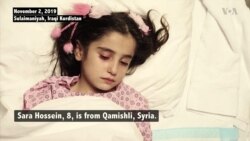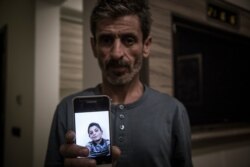"I am not going to go to school anymore after losing my leg. People will make fun of me," screamed Sara Yusuf Hossein, 8, as her mother tried to console her.
Sara lost her right leg and her left leg was fractured when a rocket hit her home in Qamishli, Syria, on Oct. 10. Her older brother Muhammed, 13, died immediately in the strike, and her younger brother Ahmed, 7, lost vision in his right eye.
They are some of the victims of the conflict that broke out in northeastern Syria last month as a result of the Turkish military operation against Kurdish forces.
Nariman Adil, the children's mother, recalled to VOA the moment the rocket landed on their home. The children were playing in their front yard in the Qudorbak neighborhood of Qamishli when the shelling happened.
"I could not see anything when I went out. Smoke blocked out everything. I felt some liquid under my feet. I looked down and saw my daughter on the floor. Her blood was running on the ground. When I looked out the door, I saw Muhammed's blood was running on the street," said the grief-stricken Adil, who said she had barely been able to eat or sleep since the incident.
Traumatized by the attack, their father, Yusuf Hossein, is unable to talk. The couple and the remaining two children fled to Iraqi Kurdistan's Sulaymaniyah province, where they were receiving treatment.
Adil told VOA it was a hard decision for the family to leave Mohammed's body behind. He had to be buried in Qamishli before the rest of the family could begin the dangerous 55-mile journey to the Iraqi Kurdistan border.
"When we took Muhammed to the hospital [in Qamishli], they said he was dead. ... We took Muhammed home and buried him later," she said, sobbing.
Not in 'safe zone'
One of the largest Kurdish cities in northern Syria, with an estimated population of 400,000, Qamishli serves as the administrative capital of Syrian Kurds. Despite its closeness to the Turkish border, the city has been excluded from the "safe zone" area agreed upon on Oct. 17 by the U.S. and Turkey, as well as on Oct. 22 in a Russia-Turkey agreement.
Through the agreements, Turkey aims to create a 30-kilometer (19-mile) zone across its southern border where the Kurdish elements of the Syrian Democratic Forces (SDF) will be forced to withdraw.
Turkish officials say they cannot tolerate along their borders any presence of the Kurdish fighters known as the People's Protection Units (YPG), which Ankara sees as a terrorist organization.
The United States, however, considers the YPG a key ally that did the bulk of the fighting against the Islamic State group in Syria.
The United Nations has warned that the recent offensive by Turkey in the region could spark a humanitarian crisis leading to "another catastrophe" in Syria, which has been wracked by violence since 2011. The U.N. estimates dozens of civilians have been killed and more than 180,000 displaced since the beginning of the Turkish operation last month.
Jens Laerke, spokesperson for the U.N. Office for the Coordination of Humanitarian Affairs (OCHA), last month said the organization would remain in Qamishli, despite the deteriorating security situation, to provide essential aid to those affected by the conflict.
The U.N. will stay to deliver humanitarian assistance to Qamishli's affected residents "until it becomes absolutely impossible to do so," Laerke told reporters during a briefing in Geneva on Oct. 15.
No return
For Adil and her family, going home to Qamishli is out of the question for a long time, even if life in the city returns to normal.
"In the house where we lived in Qamishli's Qudorbak, there was no military," she told VOA, adding that she felt Kurds in the region were being targeted under the pretext of fighting terrorism.
"Who are terrorists? Am I a terrorist? Were my daughter, that boy [Ahmed] and my 13-year-old son terrorists?" she asked.







